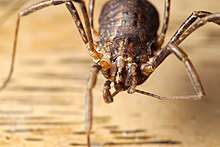Protolophus
Protolophus is a genus of harvestmen in the family Protolophidae.[1][2][3][4]
| Protolophus | |
|---|---|
 | |
| Protolophus sp. | |
| Scientific classification | |
| Kingdom: | Animalia |
| Phylum: | Arthropoda |
| Subphylum: | Chelicerata |
| Class: | Arachnida |
| Order: | Opiliones |
| Family: | Protolophidae |
| Genus: | Protolophus Banks, 1893 |
ITIS Taxonomic note:
- While Protolophidae has been nested within Sclerosomatidae by some workers, it has been traditionally recognized as a separate family (Giribet et al., 2010); although a recent treatment (Kury in Zhang, 2013) does not recognize the family Protolophidae, others do (Hedin et al., 2012; Kury website 'Classification of Opiliones' (2014)).[2][5]
Species
- Protolophus cockerelli C.J.Goodnight & M.L.Goodnight, 1942
- Protolophus differens C.J.Goodnight & M.L.Goodnight, 1942
- Protolophus dixiensis Chamberlin, 1925
- Protolophus longipes Schenkel, 1951
- Protolophus niger C.J.Goodnight & M.L.Goodnight, 1942
- Protolophus rossi C.J.Goodnight & M.L.Goodnight, 1943
- Protolophus singularis Banks, 1893
- Protolophus tuberculatus Banks, 1893
gollark: https://phineasandferb.fandom.com/wiki/Disney%27s_Phineas_and_Ferb:_The_Best_LIVE_Tour_Ever!/Transcript
gollark: Yes. I actually know about all circumstances simultaneously.
gollark: As planned.
gollark: Well, I dislike some of your actions even given circumstances, see.
gollark: Oh, we just alter speed limit signs with specialized optical equipment.
References
- Joel Hallan (ed.). "Sclerosomatidae Species Listing". Biology Catalog. Texas A&M University. Archived from the original on October 13, 2014. Retrieved December 27, 2010.
- "Protolophus Report". Integrated Taxonomic Information System. Retrieved 2018-02-23.
- "Protolophus Overview". Encyclopedia of Life. Retrieved 2018-02-23.
- "Browse Protolophus". Catalogue of Life. Retrieved 2018-02-23.
- Kury, A.B. (2014). "Classification of Opiliones". National Museum of Brazil. Retrieved 2018-02-23.
This article is issued from Wikipedia. The text is licensed under Creative Commons - Attribution - Sharealike. Additional terms may apply for the media files.